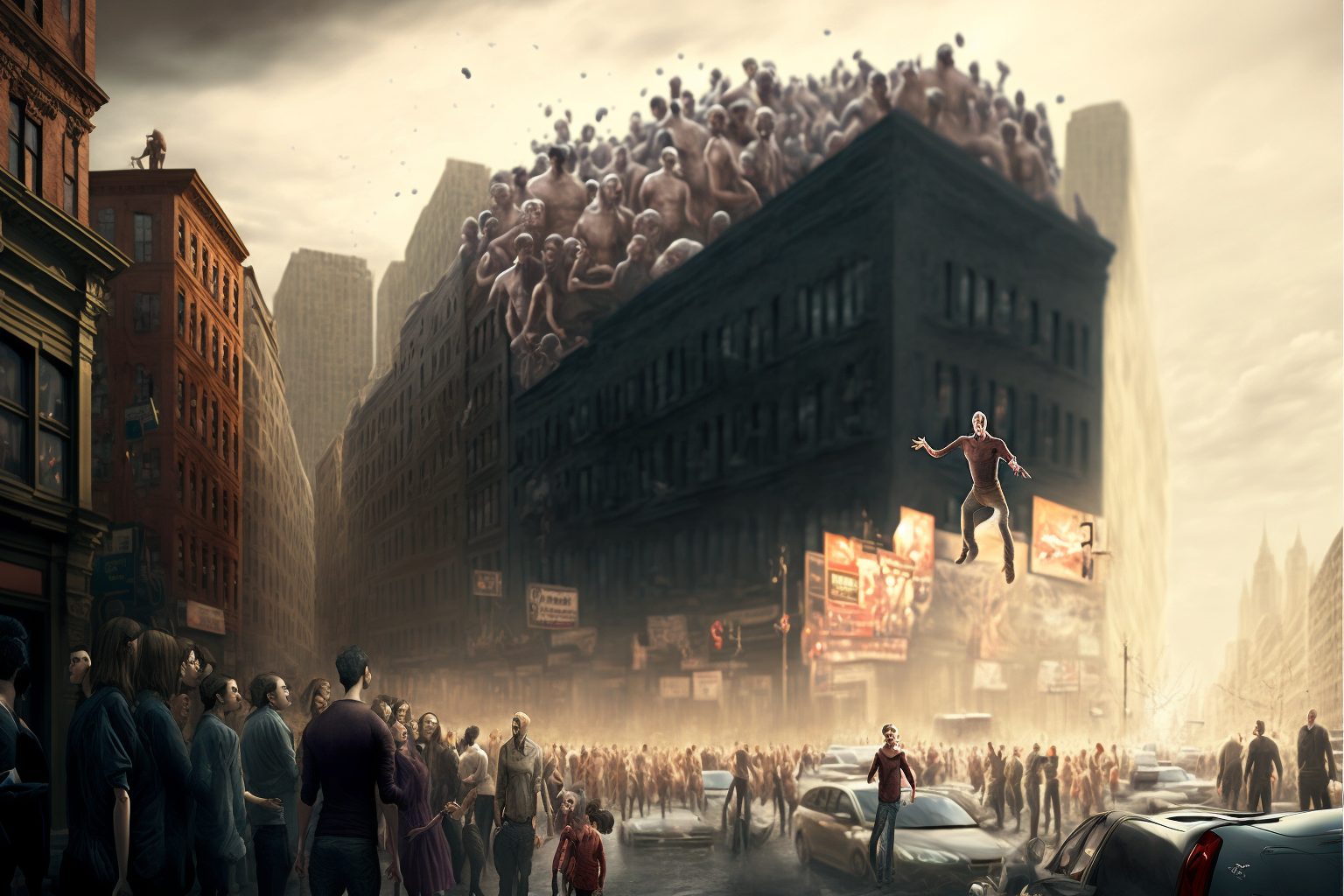Oh The Humanity
Artificial Intelligence (AI) has been a hot topic recently, with many speculating about its potential impact on the future. While some see it as a valuable tool, others fear that it could lead to the downfall of humanity. I can’t predict the future, no one can, but if doomsday is coming, it will be 100% manufactured and executed by humans, not AI. With that out of the way, let’s explore some of my thoughts on AI.

“Humans Being Human”
AI as a Tool for Creativity
In the short term, AI has already become an extremely powerful tool to assist in creativity. At Unexpected Creative, we use AI to generate new designs, write compelling copy, and even compose music. For example, AI-powered design software can create unique graphics and layouts based on a set of parameters, saving designers time and allowing them to focus on the more creative aspects of their work. Similarly, AI-powered writing software can assist copywriters in generating catchy headlines and persuasive language. We use it to help create and organize outlines for writing. The possibilities are endless.
One of the most significant benefits of using AI in the creative industry is the ability to generate new ideas and concepts that may not have been possible before. With AI, designers and writers can explore new possibilities and push the boundaries of creativity. AI can also assist in tedious and repetitive tasks, like editing and proofreading, allowing creative professionals to focus on more critical and creative tasks.
The Potential for Long-Term Benefits of AI
But I’m not just about the present. The long-term benefits of AI are even more exciting. As AI technology advances, it has the potential to greatly benefit humanity in many ways. The possibilities are endless, from improving healthcare and education to tackling global issues such as climate change.
One of the most promising applications of AI is in the field of healthcare. AI-powered diagnostic tools can analyze medical images and assist doctors in detecting diseases such as cancer at an early stage, improving patient outcomes. AI can also analyze large amounts of medical data to identify patterns and trends leading to new treatments and cures. And has the potential to revolutionize the way we diagnose and treat diseases. There are many ways in which AI can be used to enhance the healthcare experience, including:
- Medical Imaging
AI-powered medical imaging systems can analyze medical images, such as X-rays, CT scans, and MRIs, to assist doctors in detecting diseases such as cancer at an early stage, improving patient outcomes. - Predictive Analytics
AI-powered predictive analytics can analyze large amounts of medical data to identify patterns and trends leading to new treatments and cures. - Clinical Decision Support
AI-powered clinical decision support systems can assist doctors in making more accurate diagnoses and treatment plans. Drug Discovery: AI-powered drug discovery systems can be used to identify new drugs and treatments for diseases.
These are just a few examples of how AI can enhance the healthcare experience. The possibilities are endless, and as technology continues to evolve, we can expect to see even more innovative applications of AI in healthcare. However, it is important to note that AI should support and enhance traditional healthcare practices, not replace the human factor in healthcare. AI can assist in providing accurate and timely information and support, but the human healthcare provider will always play an essential role in the healthcare process, providing emotional support, motivation, and personal touch, which AI can’t replace. And let’s remember human ingenuity and the skills trained professionals possess. AI is great with data, but so much more goes into healthcare.
Revolutionize Learning with AI: The Future of Education
AI can personalize learning experiences in education, adapting to each student’s unique needs and abilities. AI-powered tutoring systems can provide immediate feedback and guidance, helping students to progress at their own pace. There are many ways in which AI can be used to enhance the educational experience, including:
- Personalized Learning: One of the most promising applications of AI in education is personalized learning. AI-powered systems can analyze students’ performance, learning style, and interests and adapt the learning experience to meet their unique needs and abilities. For example, an AI-powered tutoring system can provide immediate feedback and guidance, helping students to progress at their own pace.
- Intelligent Tutoring Systems: AI-powered intelligent tutoring systems (ITS) can provide students with personalized, interactive instruction. ITS can assess a student’s understanding of a topic, provide feedback, and adapt instruction accordingly. For example, an ITS can give different explanations for a concept based on the student’s level of understanding.
- Automated Essay Scoring: AI-powered automated essay scoring systems can be used to evaluate students’ writing. These systems can analyze an essay’s content, structure, and style, providing feedback and scores. This can save teachers time and allow them to focus on delivering more personalized instruction to students.
- Adaptive Learning Platforms: AI-powered adaptive learning platforms can analyze a student’s progress and adjust the curriculum accordingly. For example, an adaptive learning platform can identify areas where a student is struggling and provide additional resources or instruction to help them improve.
- Language Translation: AI-powered language translation can be used to help students learn a new language. An AI-powered language translation app can translate text, speech, and images in real-time — allowing students to communicate with native speakers and practice their language skills.
Tackling Climate Change with the Power of Artificial Intelligence
AI can also be critical in addressing global challenges such as climate change. AI-powered systems can be used to analyze large amounts of data. This will help to identify patterns that can help us better understand and predict the impacts of climate change. For example, AI can monitor the Earth’s surface, oceans, and atmosphere to detect changes and track the effects of human activities on the environment. Models can be set up to predict natural disasters giving us better warning systems.
Excited About the Future of AI
AI will be a valuable asset in helping me generate new and innovative ideas, and I am committed to exploring its potential to the fullest. I am working to integrate it into my creative process and am excited to create with this tool.
AI is a powerful tool that has the potential to greatly benefit humanity in many ways. As a Creative Director, I see the potential for AI to revolutionize the way we approach problem-solving and idea generation. With the collaboration of humans and AI, we can push the boundaries of creativity and bring about a brighter future for all. We are excited to be at the forefront of this new era and can’t wait to see what the future holds.
Most of the people I talk to about AI head straight for the exit talking about how it will bring the end of humanity. The possibilities are endless, and we expect to see even more innovative applications as technology evolves. How we use them to our benefit or detriment will depend on us. I hope I’m opening more than a few eyes to AI by providing these examples. I want people to think about the possibilities and use these tools to experience their benefits. For example, you can use a gun for hunting, sport shooting, or self-defense. A firearm can efficiently and effectively achieve a specific goal in these situations. We need to look at AI the same way. It can be dangerous, yes. But on its own, it is not. It will come down to how we choose to use it. It will be what we, as humans, make of it.

